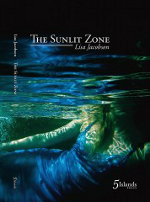
The Sunlit Zone by Lisa Jacobson
5 Islands Press, 2012
The verse novel is a peculiar organism: descended from the sweeping epics that chronicled the birth of nations and the misadventures of wayward heroes, we can still find characters struggling on their ‘grand’ journey – likely to be a personal, emotional and/or psychological journey – with the occasional battle scene (though, this is more likely to take place on a much smaller, personal level). As a distinctly modern form, there is certainly much less aggrandisement of the natural world via mythical and magical hyperbole in the verse novel. Indeed, in these works it is common to see characters moving about a contemporary world, preoccupied with the routines and the ups and downs of everyday life. Anne Carson’s The Beauty of the Husband (2001), for example, follows the post-divorce reflections of a middle-aged woman on her marriage to a beautiful but emotionally poisonous philanderer:
His mistress at that time—indeed the very concept ‘mistress’ for him—was French. Friends of his told me that she didn’t wash and in bars was inclined to order liters of champagne on his tab. I can imagine how he would frown, curse, sigh, lift his hands and adore it. (15)
Another popular example, Vikram Seth’s The Golden Gate (1986), follows a number of twenty- and thirty-somethings as they go about their daily affairs. The excerpt below sees John (‘A linkless node – no spouse or sibling,/ No children’ (Sonnet 1.7)) chatting on the phone to ex-lover Janet:
He hears the phone ring. ‘Hello, John? Are you OK? What's going on? I just got back. I thought I'd phone you Although it's late. You sounded bad On the machine, more tired and sad Than in the whole time that I've known you.’ ‘It's nothing.’ ‘Tell you what, let's meet For lunch tomorrow. 16th Street. (from Sonnet 1.19)
Both of these works exhibit timeless themes of love, loss and longing, though the drama occurs on a scale much less grand than their epic predecessors. These works are far from celebrating the heroes or heroines of a classical ilk; in a post-realist, post-modern world characterised by ubiquitous technologies, media overload and suburban sprawl, the characters in many verse novels reek of a modern-day sensibility – disenchanted, restless and searching for a sense of belonging in an increasingly detached environment. We can see this, for example, in Australian poet Alan Wearne’s The Lovemakers (2001):
Bess loves him but since Alister was born their passion’s flickered. Well she’ll have to wear it. If centrefolds are erotica not porn, and Playboy’s bought for literary merit and some nights she will stay awake till dawn, there’s always her Henry James with which to bear it. (Alan Wearne, Book I, 346)
Indeed, the Australian poetry scene boasts a rich and varied tradition of verse novel writing, from the fast-paced crime thrillers of Dorothy Porter (The Monkey’s Mask and El Dorado) and the Odyssey-inspired verse of Les Murray (Fredy Neptune) to Wearne’s suburban monologues (Out Here) and the forceful diasporic landscapes conjured by Pi O (24 Hours). But despite diverse poetic approaches, there are notable similarities between many of these works, not least in the way the writers exhibit a distinctly Australian ‘tongue,’ steeped in a subtle – at times dark – humour. We see this in John Tranter’s conversational style:
So there was Jock, Blake’s father, thin as a weasel, not like the boys; drunk, hacking away at the roast lamb – he’d wolfed down his dinner, and he wanted second helpings (The Floor of Heaven, 24)
or with Pi O’s cheeky, self-aware migrant-speak:
A bloke (comes into
the shop) looking for Jimmy…
He asks the Boss, if he’s seen him?
Hiz kar n-o thair???? -No-
Rewn tha korna ... ??? -No-
N-o th——air??? -No-
Wai you n-o kum bifor????!
The bloke walks out of the shop ......
(Pi O, 24 Hours, 46)
or in Porter’s no nonsense expression:
There was so much crap around about the innocence of children (El Dorado, 53)
Each of these examples demonstrates the tendency, particularly in Australian verse novels, to shirk the ‘literary’ in favour of a colloquial poetics, and the result, one might argue, is a more approachable poetic mode.










Pingback: March 2013 (mostly adult) Speculative Fiction Round-up | Australian Women Writers Challenge Blog
Pingback: Stella Prize Shortlist Roundup | Australian Women Writers Challenge Blog